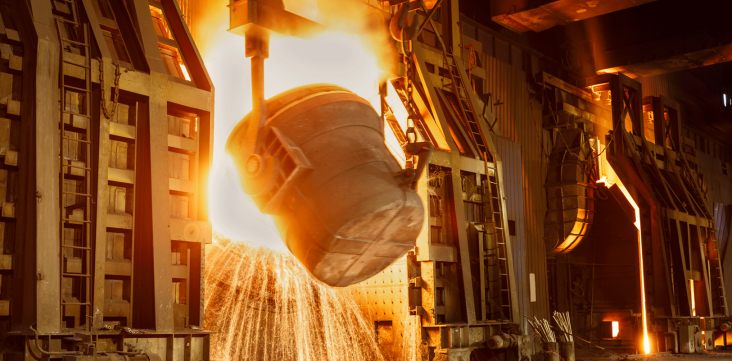NEA leaders want $3 billion steel mill to build population back
by January 13, 2022 10:46 am 2,168 views

During the 1990s one of the most prosperous counties in Northeast Arkansas took a deep plunge. Eaker Air Force Base closed in Blytheville and throughout the decade 9,000 jobs, mostly light-industrial, were lost in Mississippi County.
These job losses caused the county’s population to plunge from 65,000 to 42,000. Nucor Steel opened two steel mills since those losses and when Big River Steel opened its doors in 2014 the county received a new designation – the largest steel producing county in the country.
BRS, now owned by U.S. Steel, announced earlier this week it will expand and open a new $3 billion mill, the largest industrial investment project in Arkansas history.
Construction on the new mill is slated to begin during the first quarter of the new year and will take about two years to complete, Mississippi County Economic Development Area President Clif Chitwood told Talk Business & Politics.
The new mill will be located on a swath of land adjacent to the current BRS plant and will directly and indirectly employ about 900 workers starting in 2024. The average wage for workers will be about $100,000 annually.
Payroll at the new plant will exceed $100 million per year, and property taxes from the plant will provide about $10 million to local coffers, Chitwood said.
“It’s wonderful news. This was a competitive process. We’ve been working on this for some time,” Chitwood said. “We’re pleased they’ve chosen Mississippi County for this project.”
Luring this expansion plant to the county was a little different than luring BRS steel to NEA more than a decade ago. The county already had a prime site to offer, one that would have been classified as a certified site if the designation was in use back then, he said. The property, located just outside of Osceola not far from the Mississippi River was under option meaning it could be bought if the steel mill wanted it.
The county poured $200,000 into the original BRS site conducting soil, water and cultural studies to ensure the property could support a steel plant. The property that has been bought for the expansion plant is similar in terms of water and soil compositions so it will work to support the new project, he added. Cultural studies have identified a couple of Native American sites on the property that will have to be avoided, but there are no tribal mounds on that swath of land.
One major problem that Mississippi County has encountered in its high paying steel industry sector is that workers can either commute for wages that high or live in temporary housing during their work week and return home when they finish.
Workers in the plants come from as far away as Atlanta, Nashville, Tulsa, Little Rock and other places. Many work four, 12-hour shifts, and then return home to their families for the next four days. They rent apartments with others, lease houses or stay in the local trailer and RV parks.
County and company officials want more of the workforce to reside permanently in the county. A program is being developed where the county and company will pay 10% of the down payment on a house for workers.
“It’s an incentive to get workers to live here instead of someplace else,” Chitwood said.
The new optimized steel production facility is expected to feature two electric arc furnaces (EAFs) with 3 million tons per year of advanced steelmaking capability, a state-of-the-art endless casting and rolling line, and advanced finishing capabilities. Upon completion, the project will apply to become LEED certified, the company said.
Arkansas wasn’t the only state in the running for the mill. Alabama and Mississippi were also in the running for the mill. To land the project, Arkansas lawmakers put together an incentive package during a special session in December.
State economic developers convinced the legislature to put up $50 million in Quick Action Closing Fund money for site infrastructure. That money was moved from a reserve account during the special session.
Lawmakers also had to adapt recycling tax credits for the steel industry during the session. Those recycling tax credits will cost the state an average of $11 million a year for 14 years and $8.8 million a year if the state buys back the tax credits at a 20% discount. The legislation passed creates a new project type for steel manufacturers to qualify for an income tax credit for waste reduction, reuse or recycling equipment.
There are a number of qualifiers for the tax credits to be utilized. The steel mill project has to be located on the site of or adjacent to an existing qualified manufacturer of steel; have a total investment of at least $2 billion; create 700 new direct positions with an average annual wage of $120,000; and create 200 new independent direct positions with an average annual wage of $60,000, according to the Arkansas Department of Finance and Administration.
Billions of dollars of infrastructure investment and thousands of jobs in the region rely on the steel industry. According to U.S. Census data, Mississippi County has seen a population decline every decade since the 1950s.
There are more than 20 steel-related businesses in the county employing more than 3,600 workers. That’s about 1 in every 5 jobs in the county. There are low land and utility costs for businesses locating in Mississippi County. Access to the Mississippi River is complemented by interstate and rail access that criss-crosses north and south, east and west.
“We’re heavily invested in the steel industry,” Chitwood added.
